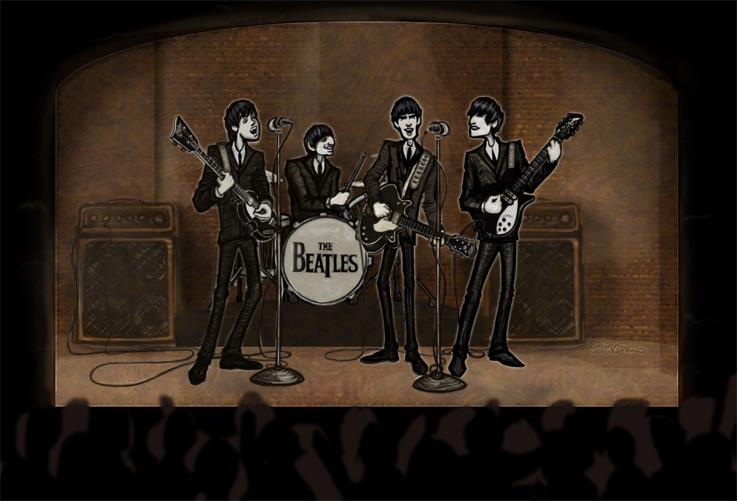The Temptations vs. The Beatles: A Comparative
In 1961, an unknown and unsigned “Rock and Roll” group named The Beatles was playing seedy nightclubs in Hamburg, Germany, while another yet unknown vocal group – The Temptations – were signed the then still fledgling Motown Records.
Although the suggestion that The Temptations rival The Beatles in any way, shape or form will undoubtedly be unsettling to die-hard Beatles fans, it will come as little surprise to Temptations fans. The more common comparison to The Beatles is The Rolling Stones, and although both were part of the “British Invasion”, the parallel stops there. The Rolling Stones were merely playing a game of catch-up with The Fab Four both creatively and commercially in the 1960s. With all due respect, The Stones output and footprint is more fairly measured over three decades, and pales in comparison to both The Temptations and The Beatles if narrowed to the 1960s.
On the other hand, The Temptations were doing their own thing musically; entirely different from not only the British Invasion, but from most of what was coming out of the United States, and even more specifically Motown. Although perhaps not as iconic as The Beatles or The Rolling Stones, their output during the 1960s and early 1970s was more prolific than the latter, and seemingly their appeal was broader and more diverse than the former.
Output
The Temptations first R&B Chart hit was in 1962, and from then until 1972 (their relevant period) they would land in the Billboard R&B Top 40 a total of 37 times, reaching the #1 spot eleven times, whereas The Beatles – from their first Billboard Pop Top 40 hit in 1964 until their breakup in 1970 – charted a total of 46 times in the Pop Top 40, twenty of which rose to #1. In the same time period The Temptations crossed over to the Pop Top 40 charts a total of 30 times, while unlike other white acts of their time like Elvis Presley, The Beach Boys and The Rolling Stones, The Beatles never once charted in the R&B Top 40.
An interesting footnote, The Beatles had nine more Top 40 hits than The Temptations during this period, and nine more #1 hits as well. Coincidentally, both groups recorded songs that featured the number “9” in the title (“Cloud Nine” and “Revolution #9”).
It’s important to point out that both The Beatles and The Temptations did continue to chart beyond 1970 and 1972 respectively. After 1970 The Beatles charted five more times with previously recorded songs, and the remaining three Beatles assembled posthumously to the assassination of John Lennon to chart with material comprised of tapes Lennon left unfinished. The Temptations charted in the R&B Top 40 thirty one more times after 1972, but the departure of Eddie Kendricks and Paul Williams in 1971/72 signaled the end of the “classic Tempts” era. Hence – for the sake of this comparative – the measure of output is from 1962 to 1972 for The Temptations and 1964 to 1970 for The Beatles.
Metamorphosis
The most striking parallel between the two groups is that both experienced a complete mid-60s musical metamorphosis.
Between 1965 and 1967, The Beatles evolved from the jangly 1950s inspired Rock and Roll of their formative years to something entirely different, and much more difficult to categorize than their earlier body of work. I suppose it could be categorized as “Psychedelic Rock”, and there is even a valid argument that The Beatles were the first to market in the genre, or at the very least were one of the pioneers. At the same time they dabbled in spiritualism and philosophy, so perhaps it’s fairer to call it an experimental period and a departure from their “mop-top” era. They literally re-invented themselves. This isn’t to say they didn’t still drop a nod to their roots every now and then. For the most part however, they became an entirely different entity. Remarkably retaining both their relevance and commercial success, and plausibly improving upon it. Only one other group in the 1960s was able to achieve such a feat, and that ((cue spotlight))… was The Temptations.
In all fairness, The Tempts didn’t quite “evolve” so much as make a complete 360. They didn’t have the luxury of unlimited studio time to experiment like The Beatles did, and their motivation to change was both more sudden, and for entirely different reasons. The Beatles evolution was brought on by a combination of eclectic factors; not wanting to tour anymore, marijuana and hallucinogenic drugs, and an inspirational producer who afforded them creative license to experiment. Ultimately this resulted in a complete transformation, from touring Rock and Roll Group into in-studio Recording Artists. In contrast, The Temptations morph was expeditious. With the misfortune of having to change lead singers mid-career – often a death sentence to music groups – they rolled the dice by leaving their 1950s inspired R&B and ballad style behind, tackling what is commonly defined as “Psychedelic Soul”, a genre pioneered by Sly and The Family Stone.
With The Temptations transformation, they began to rely less on the lead singer, and instead their new arrangements traded lyrics more freely among all five group members, all of whom were talented singers in their own right. As a result, the Tempts sound became “more whole”. It was during this period that The Temptations charted higher on the Top Pop 40 charts then they had in their entire previous incarnation. This lends to the theory that – like The Beatles – they not only retained their relevance and commercial success, they improved upon it.
It could be argued, particularly in the case of The Beatles, that such a metamorphosis would be easy, and unsurprising. The Beatles were unquestionably one of the first “Rock and Roll bands”, so is it really that remarkable of an achievement? On the flip side, there had been countless vocal harmony and Doo-Wop groups prior to The Temptations, and none of them had morphed at all. So here’s the crux; Besides The Beatles and The Temptations, has any other group maintained success on both sides of such an extreme shift?
In all fairness, several groups do come to mind.
Fleetwood Mac (formed in 1967) was more of a Blues/Rock band, yet it was not until they shifted to a Pop/Rock orientation in 1975 that they achieved any sort of commercial success. In contrast were The Beach Boys who attained massive Pop success in the early 1960’s. But due to a series of mental breakdowns suffered by chief songwriter and producer Brian Wilson, 1966 marked the end for The Beach Boys experimental period.
Other great groups like The Rolling Stones didn’t transform at all, nor did they need to. They stayed their course and kept to a successful formula that garnered them commercial success while maintaining their relevance. In all fairness, they may have dabbled in different experimentations, but it was just that… dabbling. Metamorphosis is not necessary in a group’s career, it is merely unique and worthy of remark. In this respect The Beatles and The Temptations were unquestionably remarkable.
Songwriting
It’s here that The Temptations fall short, but then again, who doesn’t. All but three of The Beatles Pop Top 40 hits were written by a member of The Beatles. This isn’t to say they didn’t cover other artists’ material. They often did. Yet by design or coincidence, nearly 100% of The Beatles hits were home-grown.
Pretty much every other prolific Pop songwriter/songwriting team in the 1960s was a part of the same formidable organization as The Temptations, Motown Records. Names like Smokey Robinson, Holland-Dozier-Holland, Ashford & Simpson, Norman Whitfield and Barrett Strong (to name a few). Even Kenny Gamble and Leon Huff – who later achieved songwriting fame for the Philadelphia International label – penned a chart-topping Temptations/Supremes duet.
That The Beatles authored most of their own tunes is a massively impressive feat, yet this fact alone does not make them the greater recording artist. Taking a great song and making it a hit is what it all boils down to. Elvis Presley, who out sold and out-charted The Beatles, did not write his hit songs.
Cultural Relevance and Irrelevance
The Beatles broke up in 1970, and the split made headlines, with the four former Fabs using the press to slander one another in public forum. The Beatles end was not pretty, but it was most certainly final with each Beatle launching a successful solo career. Additionally, each of the four was able to attain multiple #1 hits, hence retaining both musical and cultural relevance as solo artists. The music of The Beatles did go through a period of diminished relevance amongst the youth of the 1970s, which was to be expected of your parent’s music, but this period was short-lived. The Beatles soon returned to the Icon status they still hold today.
The Beatles relevant period essentially began in 1964 until their breakup in 1970. The Temptations relevant period mirrored the 1964 start, and continued into 1972. Post-1972, The Temptations began a steep decline into epic irrelevance. To this day, they have yet to officially “break up”, and there have been dozens of lineup changes since their dual peaks of musical and cultural significance. David Ruffin and Eddie Kendricks – both of whom had left The Temptations by 1972 – continued on as solo artists, with Kendricks achieving somewhat greater commercial success.
Both The Beatles and The Temptations are part of our cultural fiber, and the recordings of both groups are featured on television programs and in motion pictures, while their songs are covered again and again by countless artists.
In summary, although both groups existed in the same time period, they aren’t commonly considered as competitors in any way. Being contemporaries, they would have competed for chart positioning, yet the likeness stops there. The contrasts between the two groups were great enough to make their trajectories similar, but not parallel.
As a massive Beatles fan, I am always searching for artists that might challenge The Beatles perceived supremacy, although a correlation of The Beatles and The Temptations may be more juxtaposition than comparison. Both groups produced excellent music, style icons, and ambassadors (respectively) of their particular genre of music in their own country, as well as abroad.
But most importantly, both groups have given us the gift of great music.
-Craig
Beatles illustration courtesy of Sean Gallo



Excellent article Craig. I sometimes refer to The Temptations as “The Beatles of R&B”.